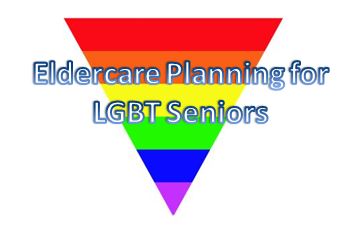
1. For same-sex couples, the variation between state laws with regards to marriage can have major impacts. People may not initially think about how this impacts retirees/elders, but the differences can be significant in regards to retirement benefits and various forms of eligibility. The good news is that the treasury and IRS announced this year that all legal same-sex marriages will be recognized for federal tax purposes regardless of the state in which the couple now resides (did not apply to civil unions/domestic partnerships). This means that employer plans (spousal benefits, healthcare plans, etc.) covered under ERISA will have to recognize those marriages under the terms of their benefits. However, there are a lot of complexities with these rulings, including the fact that governmental and church plans do not fall under ERISA. We would suggest planning regular appointments to review financial, estate and tax issues since these laws and rulings are developing.
2. It is essential to get good advice on estate planning. We strongly encourage everyone to complete key legal documents related to estate planning, with the help of an experienced attorney. Because inheritance laws are typically based on “traditional” family structures, you need to ensure you have the proper documentation to reflect your preferences/plans. Meet with an experienced attorney for advice on estate planning and estate tax issues.
3. Do advance care planning. You should complete essential healthcare planning documents including a living will and power of attorney for healthcare/designation of healthcare surrogate. A durable power of attorney (for financial and other decision-making) is also an essential part of eldercare planning. In addition, talk to medical providers about completing paperwork for designating persons you would like to have access to your healthcare information (HIPPA forms). The healthcare surrogate document is typically triggered by incapacity but many people have a partner/friend assist with managing healthcare prior to being incapacitated. Having current documents in place can help clarify things for healthcare providers, and the process of completing these documents is also a good time to talk with your designated decision maker(s) about your beliefs and preferences. Some of the backup systems/laws in place governing healthcare access (such as Florida’s proxy statute) are set up based on nuclear family preference, causing potential barriers for LGBT persons and their caregivers who have not made legal provisions.
*We can refer you to elder law and estate planning attorneys in the Tampa Bay area with the knowledge and experience to help you.
4. Look at your long-term care options. Consider long-term care insurance and if you are in a same-sex partnership, find out how the insurance provider treats coverage for couples in your situation. Look at your financial preparation for long-term care needs and learn a bit about the options for getting care and related costs/programs to help. Understand program eligibility rules and how programs treat same-sex partnerships in these rules. Consider an eldercare consultation with a professional geriatric care manager, particularly if you or your loved one has a chronic or progressive diagnosis.
Our Aging Wisely eldercare planning advice is smart planning for anyone to consider in the realm of retirement and later life planning. However, due to some of the additional complexities for LGBT elders, these planning issues take on special significance. Additionally, we highly emphasize having expert input and reviewing these issue regularly. The Supreme Court DOMA decision this year and the recent rulings by the IRS and Department of Treasury are two major examples of how things are evolving.
Contact Aging Wisely’s Senior Care Consultant at 727-447-5845 for help with your questions or concerns. For more about how we can help, our mission and resources, click the link below for our October Monthly Mission flier:
Aging Wisely, your advocacy partner, with information, resources and assistance
 Popular Downloads
Popular Downloads


 Get Our Newsletter!
Get Our Newsletter! Mission Statement
Mission Statement

